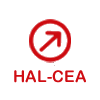Auto-adaptation of ecog-based motor bci using neural response decoder: a cross-patient study
Résumé
Motor imagery brain-computer interfaces (BCIs) face challenges in practical application, notably in decoder training. Traditionally, decoders are trained in a supervised manner. This approach requires labeled data and restricts users to predefined actions during the training period. Moreover, regular decoders are needed. To tackle this, the auto-adaptive BCI (aBCI) infers training labels directly from brain signals using a neural response (NR) decoder, eliminating the need for supervised sessions. This study investigates the replicability of the aBCI and explores labeling strategies using electrocorticography data from three spinal cord injured patients across diverse paradigms. Results indicate performance variations among patients. The labeling strategy, focusing on correct neural responses (CNR), demonstrates significantly improved performance compared to correct/error neural responses (CENR) labeling strategy. Despite limitations of pseudo-online simulation, our findings underscore the aBCI's promise in advancing BCI technology.
Domaines
Interface homme-machine [cs.HC]| Origine | Fichiers éditeurs autorisés sur une archive ouverte |
|---|---|
| licence |




